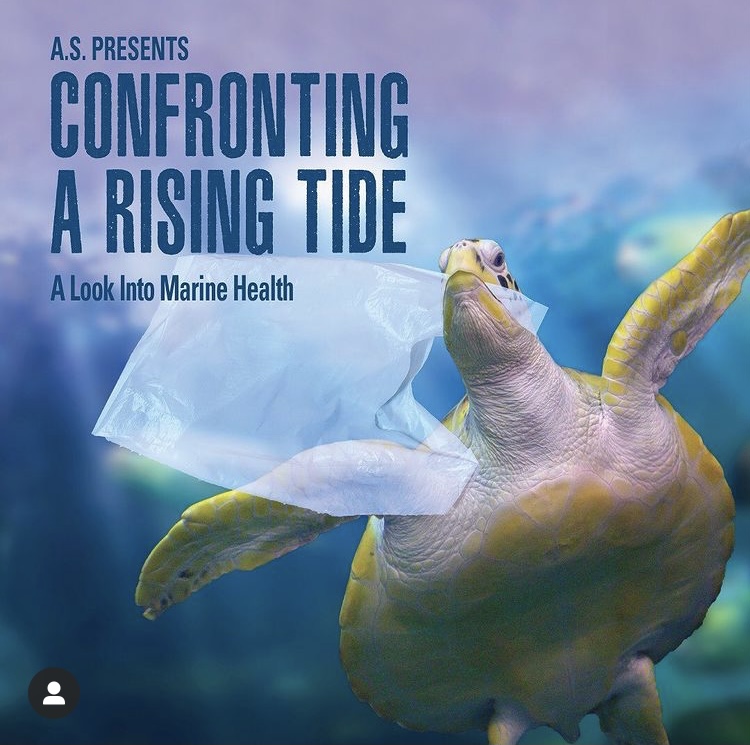Green Love, the sustainability commission of Associated Students, is set out to raise awareness on the state of marine ecosystems. The “Confronting a Rising Tide” virtual event educated students on ways to protect the coast’s wildlife and habitats on Nov. 18.
The event featured Angela Kemsley, conservation community manager of Wildcoast.
Wildcoast is an international organization focusing on ecosystem-based conservation and addressing climate change through natural solutions.
Kemsley’s philosophy strives to create a compromise that can work with everyone.
“It’s better to get local communities involved in the very beginning,” Kemsley said. “The environment has needs, the people have needs, the only way we can be successful in our conservation work is really by finding balance”
The event was a part of the commission’s “Green Lunch Bag Series” featuring different sustainability activists several times throughout the semester. Simran Jain, the commissioner of Green Love, described it as “the largest event Green Love puts out.”
Wildcoast does a variety of projects to help marine ecosystems, prevent climate change and fight rising tides throughout California and Mexico. Here’s a look at a few showcased during the virtual event.
Protect nesting sea turtles
Morro Ayuta, Mexico is home to the Olive Ridley sea turtles. Every year, millions of female turtles head to the shore to lay their eggs in an event called “arribadas.” Unfortunately, the eggs face the threat of being eaten by predators such as feral dogs, birds and humans.
Based on an old myth, the eggs are seen as an aphrodisiac, which has led to mass poaching in the region. Wildcoast created an education campaign to prevent people from harming the eggs and formed a team to protect them while they hatch.
According to Kemsley, over a million of the female sea turtles laid 92 million eggs and had over 30 million hatchlings in just one year.
Saving the coral reefs
Despite its plant-like appearance, coral reefs are animals. They are also one of the most diverse ecosystems in the world, attracting tourism for its flowers and fishes living inside. Sadly, coral reefs are frequently killed by boats dropping anchor onto them.
Wildcoast began installing conservation buoys in Baja California so that boats can attach to so that nothing can harm the reefs. The team also raised awareness by training park rangers, snorkeling instructors and scuba divers on how to swim around these protected areas. The more coral saved, the more animals to see while diving!
Capturing blue carbon
Did you know marine plants are 50 times more effective at collecting carbon dioxide than terrestrial plants? Coastal species such as mangroves, salt marshes and seagrass are known for their “carbon-storing superpowers,” Kemsey said.
The mangrove ecosystem is home to fish, birds, seals and coyotes. It also buffers against sea-level rise and storm surges. Wildcoast works with local community members to plant mangrove trees along the coast.
Cleaning border water
The Tijuana River flows directly into Imperial Beach. The river is heavily polluted by plastic, old tires and sewage from burst pipes. A continuous issue, Wildcoast is still working with the government in Tijuana to sanitize the water and remove bacteria. In order to recycle the plastic in the river, it must be thoroughly cleaned.
Many species that live in the water are becoming endangered, and those who surf near the border often get sick. In the past decade, Imperial Beach has been closed for a total of three years due to pollution. Wildcoast is currently developing a trash boom to put across the river. The trash boom creates a barrier to contain debris in the river and prevent it from flowing to the ocean.
Marine Protection Areas
Wildcoast is also active in Sacramento. The organization has spearheaded legislation that works to protect marine wildlife, including the creation of a network of 124 marine protected areas in California. The team worked to strategically place the areas around important ecosystems and breeding grounds. There is even an underwater Kumeyaay village with dozens of artifacts that is now protected near the shores of La Jolla.
This paved the way for poaching fines and no-take areas. Wildcoast helped set up half a million acres of marine protected areas in California alone.










